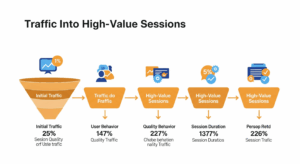Ever felt like the world of Search Engine Optimization (SEO) is constantly whispering, “Keywords are dead!”? It’s a phrase that pops up every time Google tweaks an algorithm or introduces a new AI feature. And honestly, it can be confusing. Are we supposed to abandon everything we know about how people find information online? Absolutely not! While the traditional way we think about and use keywords might be evolving, the truth is, the fundamental concept behind them—understanding what people are searching for—is more alive and critical than ever. Welcome to the era of the “keyword universe,” where intelligence, intent, and context rule.
Let’s clear the air and dive deep into why this isn’t a death knell for your SEO efforts, but rather an exciting evolution that demands a smarter, more holistic approach. Think of it as upgrading from a simple compass to a sophisticated GPS system for your content strategy.
The Myth of the “Dead Keyword”: What’s Really Changing?
For years, SEO often felt like a game of whack-a-mole: find a high-volume keyword, stuff it into your content, and hope for a top ranking. This approach, where keywords were treated as isolated entities, is indeed dying. Google’s algorithms, powered by advanced Artificial Intelligence (AI) like Gemini, are far too sophisticated for such simplistic tactics. They no longer just match strings of words; they understand intent, context, and natural language.
The shift isn’t about keywords disappearing from search. People still type words into search bars. What’s dead is the idea that a single keyword, or even a handful, can define your entire content strategy or guarantee visibility. The focus has moved from individual keywords to the broader language your audience uses, and more importantly, the problems they’re trying to solve.
Enter the “Keyword Universe”: Your New SEO Operating System
So, if individual keywords are losing their standalone power, what’s taking their place? The answer, as brilliantly articulated by experts like Kevin Indig, is the “keyword universe.” This isn’t just a fancy new term; it’s a profound shift in how we approach understanding our audience and building content.
A keyword universe is a vast, comprehensive, and interconnected pool of all the language your target audience uses to find information related to your niche, products, or services. It encompasses not just individual search terms, but questions, phrases, topics, and the underlying intents behind them. It’s about mapping out the entire linguistic landscape your potential customers inhabit online.
Why a Keyword Universe is Crucial in the AI Era:
- Holistic Understanding: It moves beyond isolated terms to give you a complete picture of your audience’s informational needs and pain points.
- Prioritization by Business Impact: The primary goal isn’t just traffic, but creating a content pipeline prioritized by its potential business impact. This helps you allocate resources effectively and choose content formats that align with commercial goals.
- Static Yet Dynamic: Unlike a one-off keyword research project, a keyword universe is a living, breathing entity. While it has a static core, it’s continuously updated to reflect evolving search trends, new products, and shifts in audience behavior.
- Building Trust in AI Search: In a world where AI models are synthesizing answers, building trust is paramount. A keyword universe helps you create content that truly addresses specific audience questions and pain points comprehensively, making your site a go-to authoritative source. When your content genuinely solves problems, conversions naturally follow.
Building Your Own Keyword Universe: Practical Steps
Creating and maintaining a keyword universe isn’t as daunting as it sounds. It requires a strategic mindset and leveraging the right tools.
1. Start with Broad Topics & Seed Keywords:
Begin by brainstorming the overarching themes and core problems your business solves. These are your seed keywords and foundational topics.
2. Expand with Diverse Data Sources:
Don’t just rely on traditional keyword tools. Cast a wide net:
- Search Console Data: What queries are people already using to find you?
- Competitor Analysis: What topics are your competitors ranking for?
- Customer Surveys & Interviews: Ask your customers directly about their questions and pain points.
- Social Media & Forums: What are people discussing on Reddit, Quora, or industry-specific forums?
- AI Tools for Categorization: Leverage modern AI tools to categorize and group related keywords by intent. This is where AI truly shines, helping you make sense of vast datasets.
- Google’s “People Also Ask” & Related Searches: These offer direct insights into related queries.
3. Group by Intent, Not Just Volume:
This is a critical shift. Instead of just high search volume, focus on grouping keywords by intent:
- Informational Intent: Users looking for answers (e.g., “how to bake sourdough”).
- Navigational Intent: Users looking for a specific site or brand (e.g., “Amazon login”).
- Commercial Investigation Intent: Users researching products/services (e.g., “best noise-cancelling headphones reviews”).
- Transactional Intent: Users ready to buy (e.g., “buy iPhone 15 pro max”). Align your content strategy with these intents.
4. Map Content to Your Universe:
Once you have your keyword universe grouped by intent, map your existing content to it. Identify gaps and opportunities.
- Content Pipeline Planning: Use the keyword universe to plan your future content creation, ensuring every piece serves a specific audience need and business goal.
- Resource Allocation: Determine content formats (blog posts, videos, landing pages, tools) and allocate resources based on the potential impact of addressing specific clusters of intent.
5. Maintain and Evolve:
A keyword universe is a living document.
- Track Created Content: Keep tabs on what content you’ve already created for specific queries and intents.
- Custom Click Curves: For more advanced strategies, build custom click curves to project potential revenue from ranking for certain keyword clusters.
- Regular Review: Periodically review and update your keyword universe to reflect market changes, new product launches, and evolving user behavior. This ensures you’re always addressing the most important and current queries.
Conversions Follow Trust: The Ultimate Goal
In the age of AI-based search, where algorithms are increasingly sophisticated at understanding nuance and providing synthesized answers, building trust is paramount. Your keyword universe isn’t just about getting traffic; it’s about becoming an authoritative, trustworthy source.
When your content thoroughly addresses user questions, solves their problems, and provides genuine value, you build authority. And when users trust your authority, conversions naturally follow. Whether it’s a purchase, a sign-up, or a download, the decision to convert is often rooted in the perceived reliability and expertise of your brand.
The Future of SEO: Exploration and Adaptation
The notion that keywords are dead is a misnomer. It’s not about their demise but their transformation. We’re moving from a rigid, mechanical approach to a more organic, intelligent one. The keyword universe is your compass, your map, and your operating system in this evolving search reality.
Embrace this shift. Focus on understanding the totality of your audience’s language and intent. Leverage AI tools to organize and prioritize. And remember, in a world of ever-smarter search engines, genuine value, comprehensive answers, and authentic trust will always be the ultimate drivers of online success. It’s an exciting time to be an SEO professional – or anyone looking to truly connect with their audience online!







